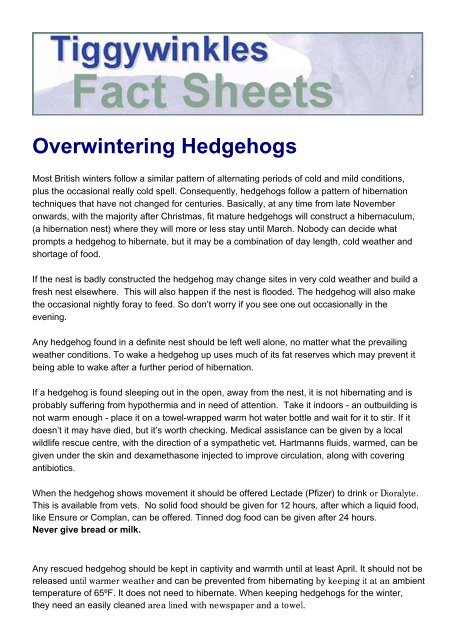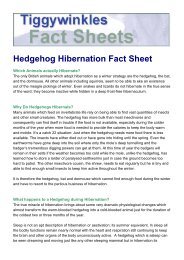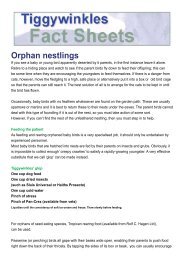Overwintering Hedgehogs.pdf - St Tiggywinkles
Overwintering Hedgehogs.pdf - St Tiggywinkles
Overwintering Hedgehogs.pdf - St Tiggywinkles
You also want an ePaper? Increase the reach of your titles
YUMPU automatically turns print PDFs into web optimized ePapers that Google loves.
<strong>Overwintering</strong> <strong>Hedgehogs</strong><br />
Most British winters follow a similar pattern of alternating periods of cold and mild conditions,<br />
plus the occasional really cold spell. Consequently, hedgehogs follow a pattern of hibernation<br />
techniques that have not changed for centuries. Basically, at any time from late November<br />
onwards, with the majority after Christmas, fit mature hedgehogs will construct a hibernaculum,<br />
(a hibernation nest) where they will more or less stay until March. Nobody can decide what<br />
prompts a hedgehog to hibernate, but it may be a combination of day length, cold weather and<br />
shortage of food.<br />
If the nest is badly constructed the hedgehog may change sites in very cold weather and build a<br />
fresh nest elsewhere. This will also happen if the nest is flooded. The hedgehog will also make<br />
the occasional nightly foray to feed. So don’t worry if you see one out occasionally in the<br />
evening.<br />
Any hedgehog found in a definite nest should be left well alone, no matter what the prevailing<br />
weather conditions. To wake a hedgehog up uses much of its fat reserves which may prevent it<br />
being able to wake after a further period of hibernation.<br />
If a hedgehog is found sleeping out in the open, away from the nest, it is not hibernating and is<br />
probably suffering from hypothermia and in need of attention. Take it indoors - an outbuilding is<br />
not warm enough - place it on a towel-wrapped warm hot water bottle and wait for it to stir. If it<br />
doesn’t it may have died, but it’s worth checking. Medical assistance can be given by a local<br />
wildlife rescue centre, with the direction of a sympathetic vet. Hartmanns fluids, warmed, can be<br />
given under the skin and dexamethasone injected to improve circulation, along with covering<br />
antibiotics.<br />
When the hedgehog shows movement it should be offered Lectade (Pfizer) to drink or Dioralyte.<br />
This is available from vets. No solid food should be given for 12 hours, after which a liquid food,<br />
like Ensure or Complan, can be offered. Tinned dog food can be given after 24 hours.<br />
Never give bread or milk.<br />
Any rescued hedgehog should be kept in captivity and warmth until at least April. It should not be<br />
released until warmer weather and can be prevented from hibernating by keeping it at an ambient<br />
temperature of 65ºF. It does not need to hibernate. When keeping hedgehogs for the winter,<br />
they need an easily cleaned area lined with newspaper and a towel.
They should be fed on one third of a normal sized tin of dog or cat food each day, with a small<br />
sprinkle of dried cat food added for crunchiness. They should also have a constant supply of water.<br />
Release should be in a garden, with access to at least nine other gardens and with a hedgehog<br />
box as a base. Make sure there are no known badger setts or main roads in the immediate<br />
area.<br />
Juveniles<br />
It has been estimated that a hedgehog needs to weigh 600 grams to survive the rigours of<br />
hibernation. Many youngsters are born late in the year and have no hope of making the weight<br />
before the onset of winter.<br />
From the end of September onwards any small hedgehog you come across should be weighed.<br />
Any bordering on 600 grams can be fattened up on tinned dog food and released before the<br />
end of October, if it makes the required weight. Smaller hedgehogs should be kept warm<br />
indoors so they stay awake, until the following Spring when they can be prepared for release<br />
back to the wild.<br />
Lungworm<br />
Most hedgehogs, particularly in the Autumn and Winter, are affected by parasites (worms) in<br />
their lungs. These can cause breathing problems and in cases of severe infestation can prove<br />
fatal. <strong>Tiggywinkles</strong> have developed a medical treatment regime which effectively irradicates<br />
the problem. Your vet can contact us for details.<br />
Injuries<br />
Obviously any hedgehog that is injured during the winter should be given treatment and kept<br />
warm and awake until April, at the earliest, or when the danger of frost has passed (earlier in<br />
Devon than in Scotland!), when it should be released so long as it has recovered from its<br />
injuries.




